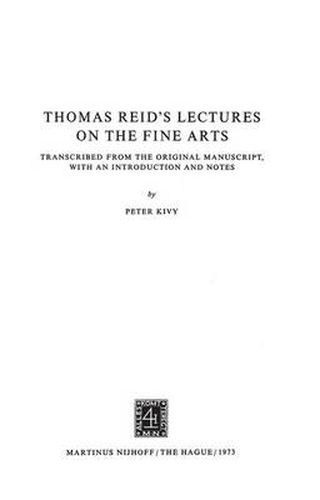Readings Newsletter
Become a Readings Member to make your shopping experience even easier.
Sign in or sign up for free!
You’re not far away from qualifying for FREE standard shipping within Australia
You’ve qualified for FREE standard shipping within Australia
The cart is loading…






This title is printed to order. This book may have been self-published. If so, we cannot guarantee the quality of the content. In the main most books will have gone through the editing process however some may not. We therefore suggest that you be aware of this before ordering this book. If in doubt check either the author or publisher’s details as we are unable to accept any returns unless they are faulty. Please contact us if you have any questions.
The past few years have seen a revival of interest in Thomas Reid’s philosophy. His moral theory has been studied by D. D. Raphael (The Moral Sense) and his entire philosophical position by S. A. Grave (The Scottish Philosophy of Common Sense). Prior to both, A. D. Woozley gave us the first modern reprint of Reid’s Essays on the Intellectual Powers of Man - in fact the first edition of any work by Reid to appear in print since the Philosophical Works was edited in the nineteenth century by Sir William Hamilton. But Reid’s aesthetic philosophy has not received its due. Woozley, in abridging the Essays, omitted the whole final essay, On Taste, which is the only extended work on aesthetic theory that Reid ever published. Raphael, being interested primarily in Reid’s moral theory, understand ably, treated aesthetics only as it was related to morality. And Grave, although he did present a short and very cogent resume of Reid’s aes thetic position, obviously found himself drawn to other elements of Reid’s philosophy. There are, of course, some accounts of Reid’s aes thetic theory to be found in the various studies of eighteenth-century British aesthetics and criticism. None, however, appears to me to do any kind of justice to the philosophical questions which Reid treats in his aesthetics and philosophy of art.
$9.00 standard shipping within Australia
FREE standard shipping within Australia for orders over $100.00
Express & International shipping calculated at checkout
Stock availability can be subject to change without notice. We recommend calling the shop or contacting our online team to check availability of low stock items. Please see our Shopping Online page for more details.
This title is printed to order. This book may have been self-published. If so, we cannot guarantee the quality of the content. In the main most books will have gone through the editing process however some may not. We therefore suggest that you be aware of this before ordering this book. If in doubt check either the author or publisher’s details as we are unable to accept any returns unless they are faulty. Please contact us if you have any questions.
The past few years have seen a revival of interest in Thomas Reid’s philosophy. His moral theory has been studied by D. D. Raphael (The Moral Sense) and his entire philosophical position by S. A. Grave (The Scottish Philosophy of Common Sense). Prior to both, A. D. Woozley gave us the first modern reprint of Reid’s Essays on the Intellectual Powers of Man - in fact the first edition of any work by Reid to appear in print since the Philosophical Works was edited in the nineteenth century by Sir William Hamilton. But Reid’s aesthetic philosophy has not received its due. Woozley, in abridging the Essays, omitted the whole final essay, On Taste, which is the only extended work on aesthetic theory that Reid ever published. Raphael, being interested primarily in Reid’s moral theory, understand ably, treated aesthetics only as it was related to morality. And Grave, although he did present a short and very cogent resume of Reid’s aes thetic position, obviously found himself drawn to other elements of Reid’s philosophy. There are, of course, some accounts of Reid’s aes thetic theory to be found in the various studies of eighteenth-century British aesthetics and criticism. None, however, appears to me to do any kind of justice to the philosophical questions which Reid treats in his aesthetics and philosophy of art.